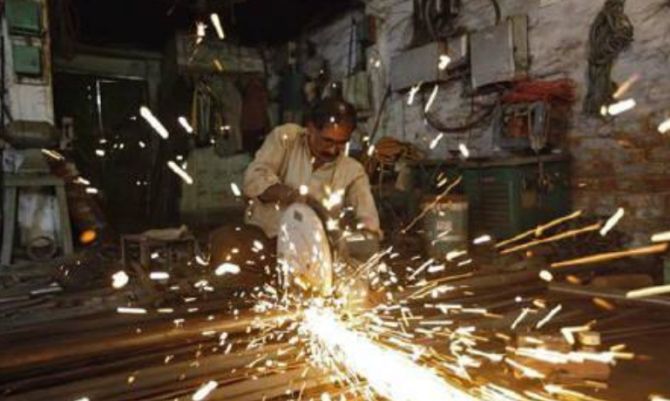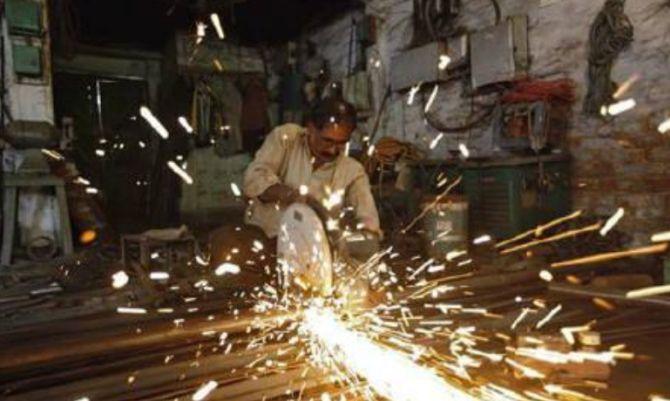New investment projects announced in the manufacturing sector declined in the three months ended June 2023.
The value of new projects was lower than in the March quarter, as well as the year-ago period, shows data from project tracker the Centre for Monitoring Indian Economy (CMIE).
The new project announcements worth around Rs 85,000 crore in the manufacturing segment in June were a 48 per cent decline from the Rs 1.6 trillion in March and a 66 per cent decline from the Rs 2.5 trillion seen in June 2022.
June marked the lowest value of quarterly manufacturing announcements since December 2020.
The decline is less severe when the pre-pandemic period is taken into account.
Manufacturing announcements in June 2019 were worth Rs 0.4 trillion, down from Rs 0.9 trillion in June 2018.
However, the announcements have risen significantly after 2020 with June 2021 seeing new projects worth Rs 3.2 trillion.
Numbers have also been rising when considered on a rolling basis over the past four quarters.
This eliminates any seasonal factors involved in announcements, as all four quarters of the year are considered.
Manufacturing investments crossed Rs 10 trillion on a rolling four-quarter basis in March 2022 when they came in at Rs 11.3 trillion.
This is the first time that this has happened in the CMIE data going back to 2009. It touched a high of Rs 16.7 trillion for the four quarters ended December 2022.
The latest number for the four quarters ended June 2023 was Rs 11.7 trillion.
Sectoral numbers show that certain key sectors have been driving announcements.
The chemicals and chemical product segment, which has dominated announcements in recent quarters, accounted for Rs 0.5 trillion, or more than half of the value of announced manufacturing projects.
Machinery, transport equipment, as well as metals and metal products, have also seen activity.
Only a few industries have historically driven investments, according to a June 2023 Bank of Baroda report on the capital formation of companies authored by economist Dipanwita Mazumdar covering a five-year period starting FY18.
The compound annual growth rate (CAGR) of company investments in India has been low relative to economic growth, according to the study.
“….fixed asset creation of corporates stands at 4.9 per cent, lower than the 9.8 per cent CAGR in nominal GDP. Further, the concentration ratio is skewed towards only a handful of industries due to their inherent nature, such as crude oil, power, and telecom,” it said.
The production-linked incentive scheme (PLI) has helped traction for manufacturing companies, according to a June 2023 note from the UK-based HSBC group entitled, ‘India: Investment Destination of the Decade and Beyond,’ authored by Director-Global Market Strategist Neha Sahni.
“As one of the beneficiaries of the regional and global supply chain reorientation, the scheme aims to bring ‘sunrise’ sectors like semiconductors and renewable energy to India…PLI has…improved the sentiment and capital availability for large-scale and high-value-add manufacturing,” it said.
The focus on local supply chains is likely to benefit countries like India and Mexico, according to the June ‘Practical Guide to a Multipolar World’ report from global financial services major Morgan Stanley.
The share of manufacturing is likely to increase, according to the note.
“In India, we see a tripling of the manufacturing base by 2031, with its share of GDP rising from about 16 per cent to 21 per cent over that time horizon,” it said.
Source: Read Full Article
-
Asian Shares Decline On China Property Woes, Fed Uncertainty
-
Hurricane Ian Donations: Tom Brady, Tampa Bay Bucs Owner Among Those Pledging Funds
-
After Dish Network Beats Q4 Earnings Estimate, Chairman Charlie Ergen Pronounces Last Rites For Rising Carriage Fees: “The Next Step In Retrans Is Down, Not Up”
-
Henkel FY22 Profit Down, Sees Slower Organic Sales Growth In FY23; Stock Down
-
China will step up policy support for economy, premier tells state media


